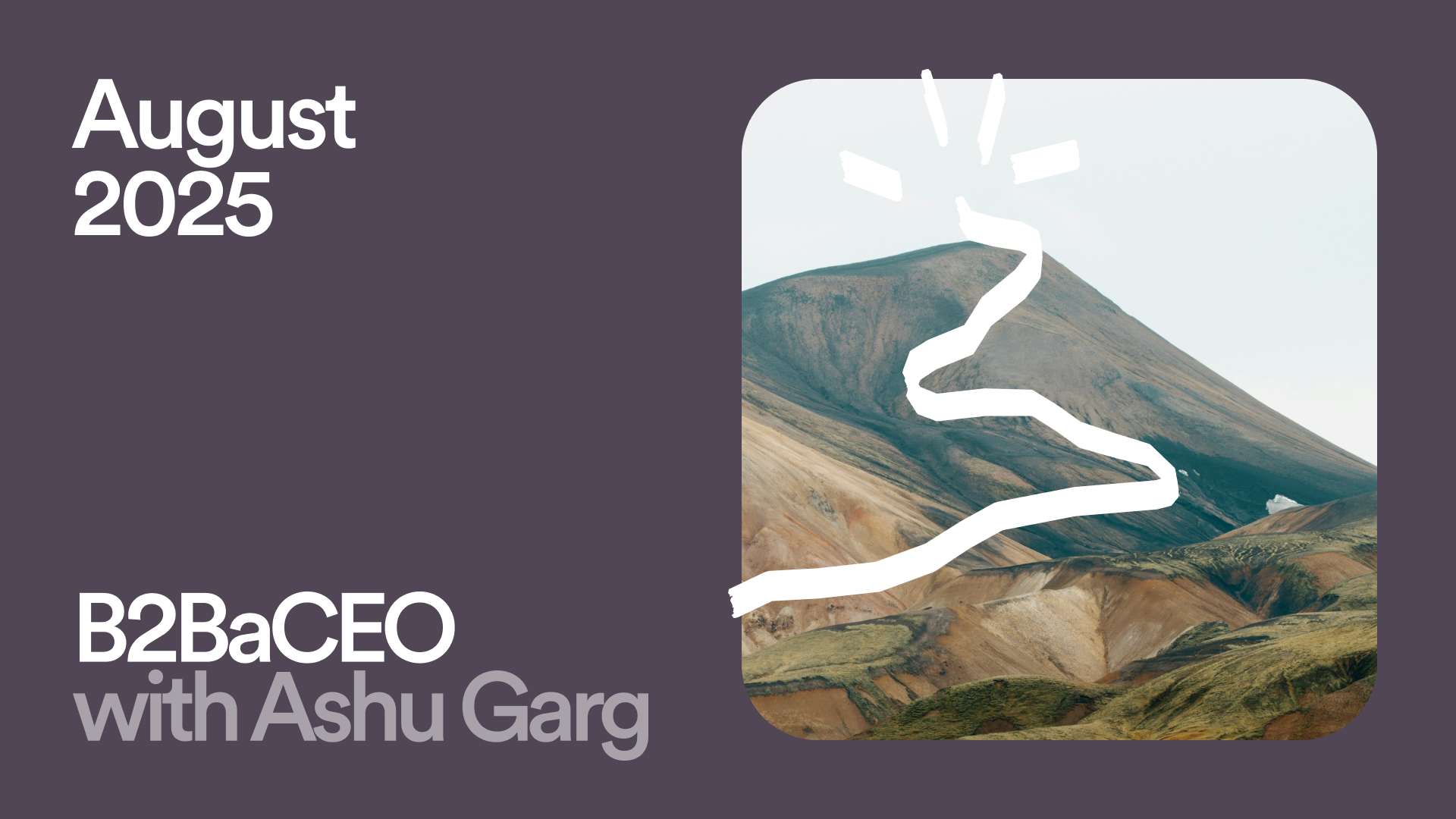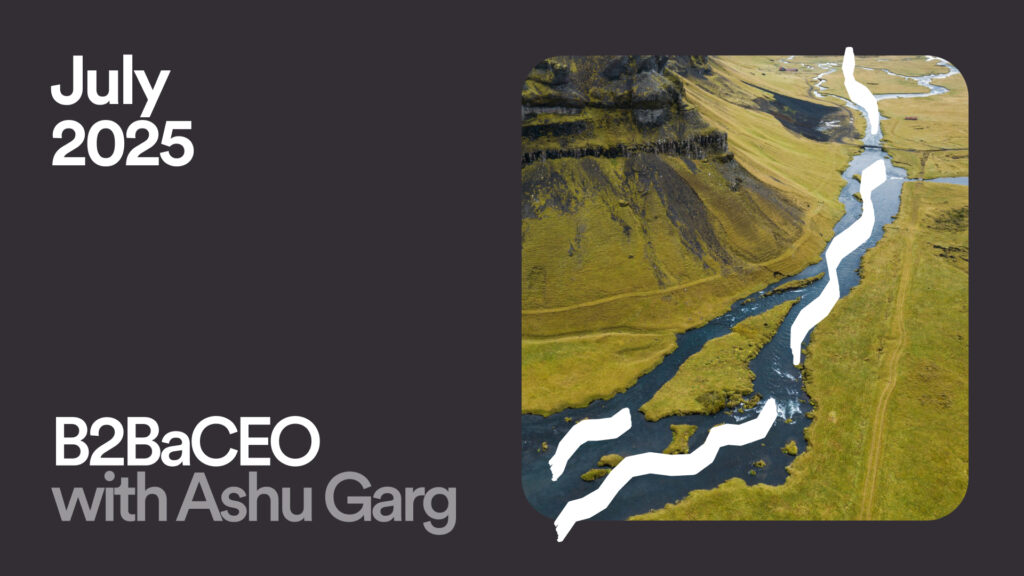Purpose is a verb
08.27.2025 | By: Ashu Garg

The case for living your purpose, not just pondering it.
Every summer, I set aside time for self-reflection and reading. This summer, I’ve been thinking a lot about the idea of purpose.
In the broadest sense, purpose is our “why”: the reason why we do things. A more pointed definition, and one that I love, comes from Kevin Kelly. In his book Excellent Advice for Living, he writes: “Your purpose is to discover your purpose. This is not a paradox. This is the way.”
In Kelly’s framing, you don’t simply identify a single fixed mission and call it done. Purpose is something you actively do. It’s not discovered by sitting and pondering until a definitive answer appears. Instead, purpose reveals itself through action. You experiment, test ideas, try activities, and reflect on which ones feel most meaningful, fulfilling, and energizing to you. Properly understood, purpose isn’t a static noun but an active verb: an ongoing, iterative process that comes into being as you live it each day.
Put differently, the feeling of having a purpose (the noun) is the fruit of living with purpose (the verb).
This month, I’m sharing a few reflections on what purpose means, how I define it for myself, and how I advise the founders I work with to think about it. My hope is that these loose thoughts help prompt your own reflection.
Big-P and little-p purpose
My recent thinking about purpose has been shaped by Jordan Grumet’s new book The Purpose Code, which I picked up on a friend’s recommendation.
Grumet, a physician and hospice doctor who has spent countless hours with people at the end of their lives, believes our culture fundamentally misunderstands purpose. We treat it as a trophy to hunt down and display: something static that we achieve once and then admire from afar. Grumet calls this grand vision “Big-P” Purpose. It focuses on the final destination rather than the moment-to-moment fulfillment found in the process of getting there.
Often, big-P Purpose reflects what we think we should want or what others expect of us. Taken too far, it can become an “achievement treadmill” – an endless chase for external validation that ends in burnout and emptiness. Even when we achieve the goal we’ve chased so intensely, the satisfaction often falls short – especially if we’ve been pursuing affirmation from others at the expense of our own authentic ambitions.
Grumet suggests embracing what he calls “little-p” purpose instead. This is not about one big revelation, but a series of small, repeatable actions rooted in things that bring you joy and serve your immediate community. Rather than announcing your Purpose as a one-time epiphany, you live it daily through concrete, intentional practices. While these acts of lowercase-p purpose may seem humble, over time they can compound into something extraordinary.
Ultimately, as a founder (or really anyone with a big goal), you need both Big-P and little-p purpose. Crucially, your big-P Purpose needs to be authentic to you. It has to spring from your deepest convictions – your burning vision for what the world could be. You won’t find it by measuring yourself against others on the achievement treadmill. It has to come from within.
Yet if all you have is this grand vision, you’ll struggle in the day-to-day grind. The journey toward a big-P Purpose is long (often endless), so it’s the small-p purposes that sustain your momentum and keep you energized.
Focus only on the big-P and you risk losing steam because you’ve ignored the sustenance of small-p wins. Focus only on the little-p and you may artificially constrain your ambition.
In praise of outsize ambition
Silicon Valley’s cultural DNA has always emphasized thinking bigger and aiming higher. For a startup taking on competitors and incumbents, being 10% better isn’t enough. You need to be 100× better. Both AI and crypto have raised the ceiling on what’s possible. With AI in particular, even tiny teams now have absurd leverage; its power makes building products or experiences that are 100× improvements on the status quo a very real and present possibility.
In the frothiest days of 2021 (which coincided with the peak of “quiet quitting” and the Great Resignation), many of us in tech wondered, quietly or out loud: “What are we actually building here?” The prevailing mood became transactional and hype-driven that it often felt like a game of “capture the flag (and the money)” rather than a genuine effort to move the world forward.
Now, at least among the founders I’m closest to, the pendulum has swung back to being missionary. These founders are comfortable signaling to their teams that achieving wildly ambitious goals means putting in intense effort. They’re hiring people who want to act as owners – true founders in their own domains – rather than employees merely checking off boxes.
With this renewed ambition comes clarity: startups aren’t for everyone, and that’s okay. A startup isn’t a 9-to-5 job. If you’re attempting something unreasonable, you’ll have to work unreasonably hard. At some point in the past few years, openly acknowledging this became controversial. But the hard fact is that building something remarkable requires remarkable effort.
Having a bold mission doesn’t mean you stop caring about business results. It means your business exists to further that mission. You can be a builder with a cause and still count revenue, because revenue is a receipt that you’ve helped someone. In my view, that belief – along with a celebration of unbounded ambition – is one of Silicon Valley’s greatest strengths.
What gives me purpose
I was raised in a family where having a higher cause was deeply important. The motto “To whom much is given, much is expected” captured the implicit expectation of my upbringing.
At the same time, growing up middle-class as the son of a university professor, financial security was something I valued from an early age. Early on, I came to realize that business would be my primary vehicle for impact – the “fulcrum” through which I’d pursue both security and purpose. Soon after, I decided software would be my industry of choice, and Silicon Valley my home.
This summer, reflecting on my purpose – both the big-P vision and the many small-p actions that comprise it – has involved examining both my “superpowers” (my “zone of genius,” as my partner Steve would say) and the activities that give me joy day-to-day.
In my opinion, my superpower is the ability to parachute into a situation (whether it’s a board meeting, an interview, or a first meeting with a founder) and, within 15–20 minutes, develop a point of view on the people (their unique strengths or “spikes”) and the business at hand – and then begin to see beyond the immediate horizon. “Seeing beyond the horizon” can mean matching a person’s spikes to opportunities I’m aware of. It can mean forming an opinion on hidden opportunities or possible speed bumps that lie around the corner. Or it can mean connecting a product to a prospective customer who doesn’t yet realize they need that product.
I also know what gives me joy on a daily basis. I find joy in simply hanging out with exceptional people and having high-bandwidth conversations on topics that fascinate me. I find joy in making connections and bringing people together who complement each other perfectly. I find joy in breaking bread with those people – sharing meals and my wine collection – and deepening relationships. I find joy in seeing people I’ve worked with flourish in their careers. And I get joy from the very real possibility that one of the companies I’ve invested in might become the next Salesforce or the next Microsoft.
When I take a step back, at its core my purpose is about connecting exceptional people to each other and to opportunities. I want to enable outstanding individuals to excel and to accelerate their potential for impact. Knowing this serves as a compass for where I focus my energy.
Scaling my impact
There are many questions I continue to wrestle with.
One of them is: How can I scale my impact? How can I amplify my ability to positively influence exceptional people’s life trajectories at a broader level?
Another is: Are there more enduring ways to enable extraordinary people to excel, beyond the avenues I’m pursuing now? I’m inspired by efforts like what Bill Elmore (one of the founders of Foundation Capital) has done with Eastside College Preparatory School in East Palo Alto, and what my friends (and university classmates) HItesh Oberoi and Neeraj Aggarwal have done by co-founding Plaksha University, a new engineering school in India.
I’ve occasionally wondered if there’s a version of those ideas I could pursue. There are some big, audacious ways to attempt this; for instance, I’ve thought about the possibility of starting a university in India myself someday. Initiatives like these might look like small-p purposes in isolation – focused on a specific community or cause – but their impact on people’s lives is incredibly meaningful. They remind me that empowering others at scale, especially through education and mentorship, can ripple outward for generations.
On a smaller scale, one way I try to extend my impact is by writing this newsletter. I write for many of the same reasons I love working with early-stage founders. Writing forces me to notice what’s happening in the world and within myself, and to sit with an idea long enough to really think it through. It’s an excuse to ask better questions. By wrestling with those questions on the page, I clarify what actually matters to me and how I can better align my actions with that.
In short, writing helps me understand my own “why” more clearly, and it lets me share that understanding with others. It’s a practice of distilling lessons and reflections in a form that can (hopefully) inspire or guide more people than I could ever reach one-on-one.
No deathbed regrets
In the world of business, money is undeniably one metric of success. As an investor or an entrepreneur, realizing your capital-P Purpose often means generating significant wealth along the way. But after a certain point, simply aggregating money rarely fulfills that deeper sense of meaning.
Here in Silicon Valley, you often meet wildly successful people who live without the expected trappings of wealth and power. They are wealthy and yet remain hungry, humble, and relentlessly curious. For them, money is a byproduct or milestone but never the ultimate goal.
People often say that on our deathbeds, we won’t wish we’d worked more. Generally, that’s true – at least if work was merely a means to a paycheck. But interestingly, research shows that one of the biggest regrets expressed by people at the end of their lives is “I wish I’d had the courage to live a life true to myself, not the life others expected of me.” In other words: I wish I’d pursued my own dreams. I take that lesson to heart. I believe in having the courage to try new things, doing work that brings me joy, and constantly evaluating what’s truly worth doing.
By dedicating yourself to endeavors that are authentically meaningful to you – both in the grand, ambitious sense and the small, everyday sense – your purpose emerges naturally through the experiences and meaning you create, rather than standing as a static destination you’re waiting to find.
Published on August 29, 2025
Written by Ashu Garg


